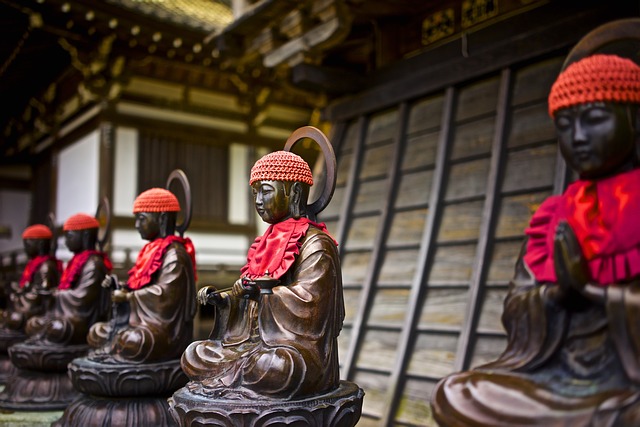We’re naturally curious about the world around us, and are drawn to things we find interesting; all of us will learn about something in our free time. It might be a new skill like crochet, web development, tennis, or horse riding; it might be the ins and outs of celebrity lives, footballer statistics, or political intrigue; and it might be an academic subject like geology, history, or… religious studies.
But why religious studies? You have so little free time! Why spend it on learning about people’s beliefs, values, communities, and practices?
Well, I’d argue, because religious systems are powerful, fascinating traditions. They come in all shapes and sizes, offer varied perspectives on who we are and why we exist, and offer glimpses of worlds we cannot see or touch, yet seem to inspire and motivate millions of people every day. They offer the very best, and worst, of human creativity, charity, and sometimes cruelty. They ask questions and provide answers about the foundations of the universe, not just in cosmological terms (as we find in the field of science), but in terms of human experience, value, morality, and meaning.
People have faced these existential questions, and the feeling of mystery that underpins them, for thousands of years. Today, well known religious communities, from the Bahá‘i Faith to the Quakers, draw on these traditions to build their own answers and establish their own frameworks for living.
I could argue that due to the developments of communication technology, transportation, and migration over the last couple of hundred years, the world is a more multicultural place, with more opportunity for conflict and misunderstanding - but really that opportunity has always been there; there have always been alien cultures encountering each other and facing challenges of interpretation and understanding.
What’s new is that we have the tools and the technology to encounter unfamiliar worlds from our own home, to share our lives and perspectives at the push of a button, to engage meaningfully with alternative ideas, beliefs, and ways of living.
We prosper and flourish when we face the world on its own terms, and a key part of that is understanding the religious traditions and cultures which form the foundation of life for billions of people worldwide.
It can sometimes feel like religion is a battleground, and there are challenges to religious literacy from reflexive political moods and violent ideological confrontations, but this only highlights how important it is to equip ourselves with balanced and insightful knowledge about the religious systems of the world. It’s hard to get an accurate picture of the world and all its unfamiliar traditions by following news stories and listening to the loudest voices - if we hope to understand what’s going on, we need to understand the importance that religion plays in people’s lives, and take those experiences seriously.
Religion is an area that is often presented as esoteric and mystical (therefore not suitable for study), a tool for social control by charismatic charlatans (therefore not suitable for following as a lifestyle), or dismissed as a psychological crutch used by the weak-willed and superstitious (therefore not something to take seriously). None of these assessments are grounded in a holistic understanding of the field, and don’t accurately reflect the impact and practice of religion on a worldwide scale.
It’s worth highlighting that religious studies isn’t about making you more religious or moral; it’s an academic subject that investigates the religious behaviours and beliefs of human beings - and carries all the benefits that come from a deeper understanding of who people are, and how they live.
Personally, I think there’s some really interesting stuff going on when people do religion, when they ask questions about meaning, truth, or beauty; when they talk to God, Allah, the Goddess, Kali, Krishna, or any other non-physical entity; when they change their clothes, their speech, or their habits to bring themselves into alignment with something that can’t be seen.
People come up with some really amazing ideas and practices that make their lives different, that make them feel differently, to connect them to their past, present, and future. People find unique ways to uncover experiences of union, joy, bliss, insight, liberation, creativity, passion, pain, loss, mystery, and the unspeakable experience of awareness. People also go to tremendous lengths to preserve and shelter the practices, beliefs, and customs of those who came before them, because they feel intimately that these things are important, or even essential, and those chains of responsibility create communities which extend back through time for hundreds or sometimes thousands of years.
So when we investigate religious studies, we’re trying to see those creative and exciting ideas, those challenging techniques of mental and spiritual illumination, those weird and wonderful events that mystify and delight and terrify and hit us emotionally.
As scholars of religion, we’re not trying to gauge whether these ideas are true or false, nor are we trying to synthesise our own view on what the ultimate meaning of the universe is. But we can ask ourselves questions about how humans have responded to the big mystery and the little mysteries, the challenges and confusions of everyday life.
It’s increasingly important for people to be religiously literate; the reality of living in a multicultural society, where many worldviews interact, means that we need understanding and knowledge if we are to live together peacefully.
Ultimately, as we study religion, we also become enriched by the millennia of shared human experience encoded within faiths, traditions, and worldviews, and stand to benefit from our investigations. So why not?

Luke Burns | Director, OCRS
Luke is the founder and director of the OCRS, and has a First Class Honours Degree in Humanities from the Open University. He lives in Somerset with his wife, Rosie.
You can find him on Twitter here: @lbburns13
